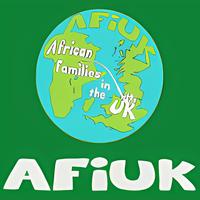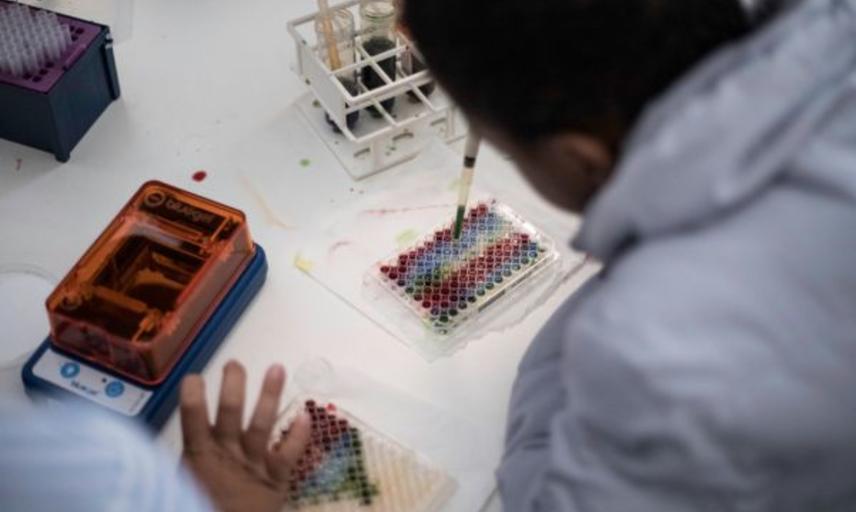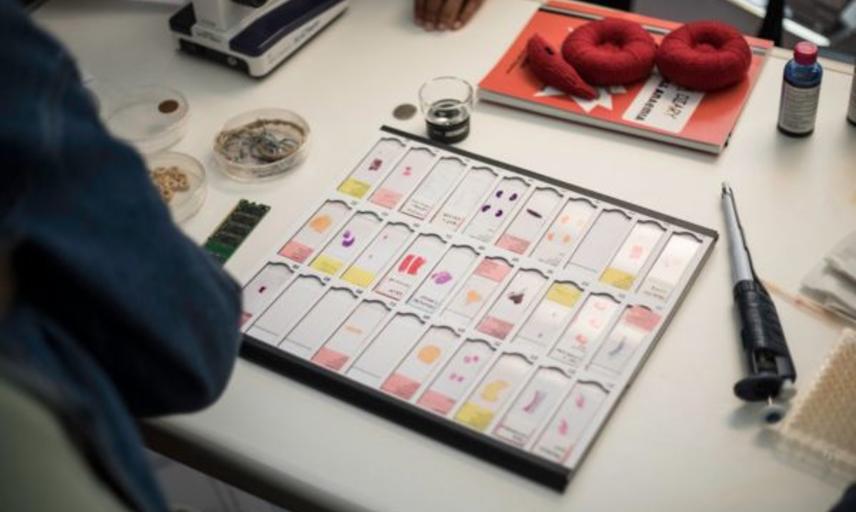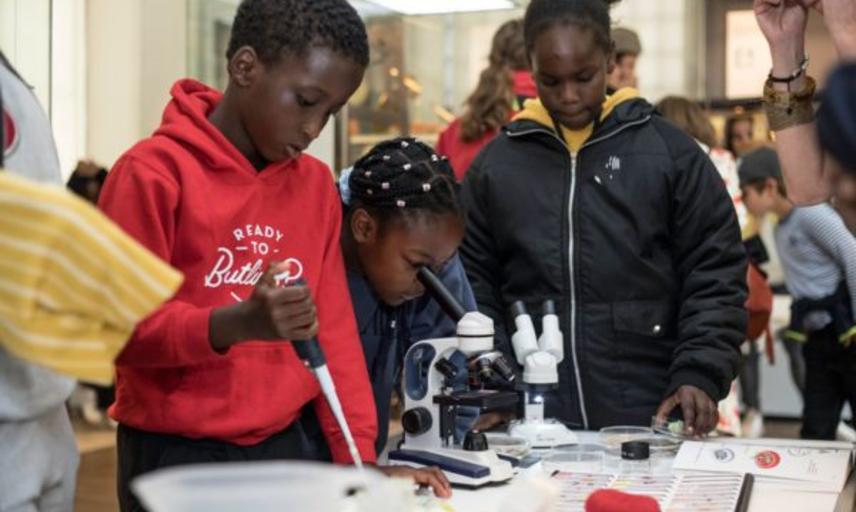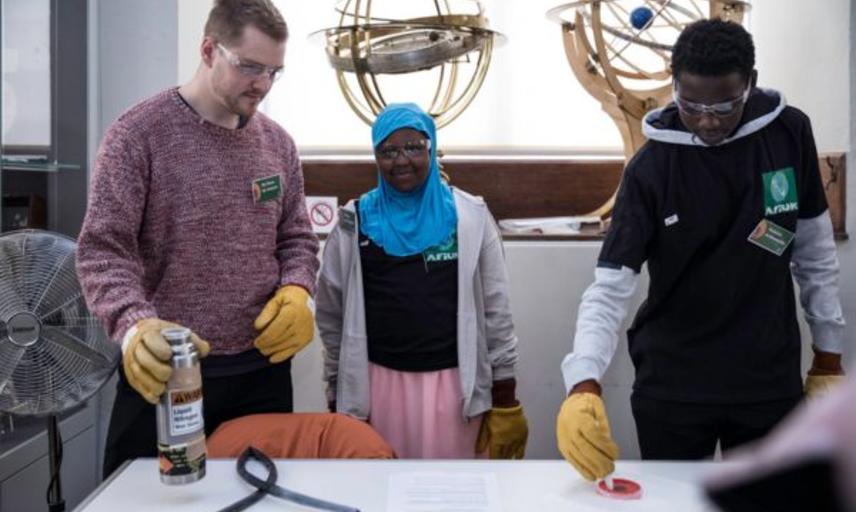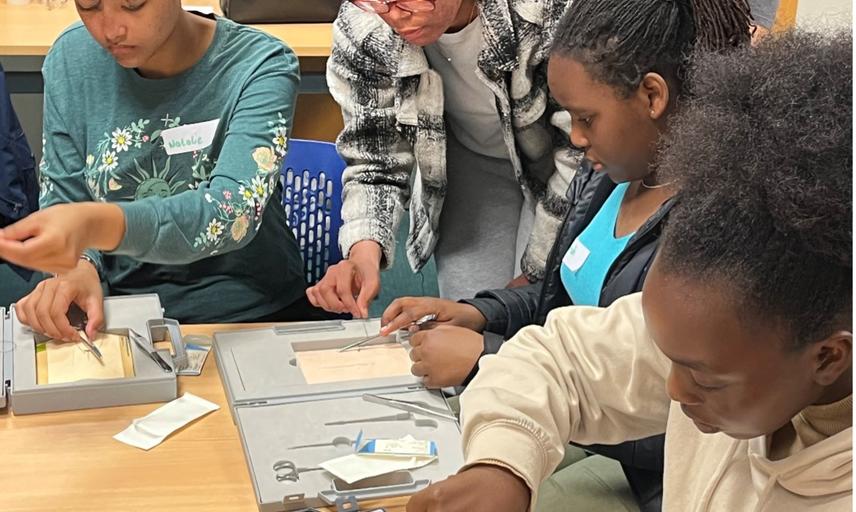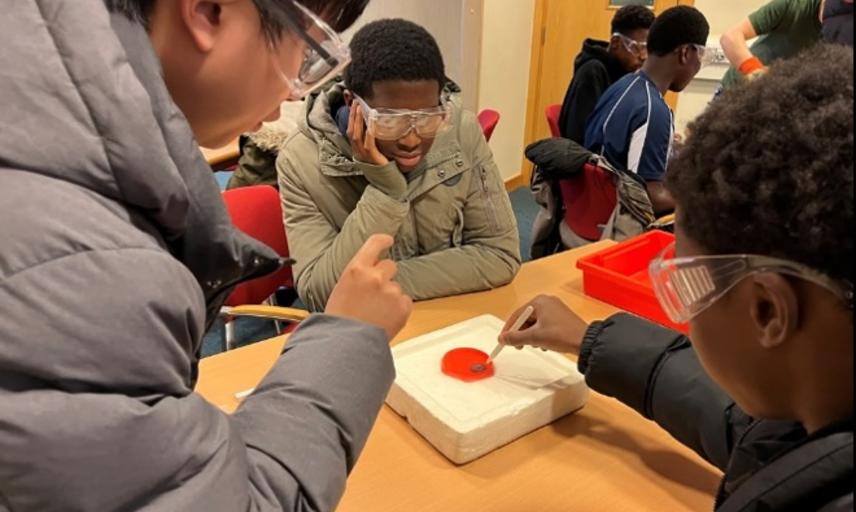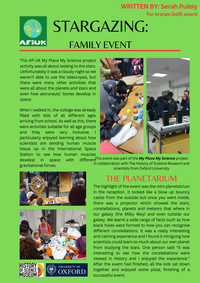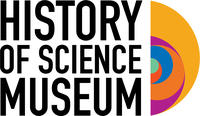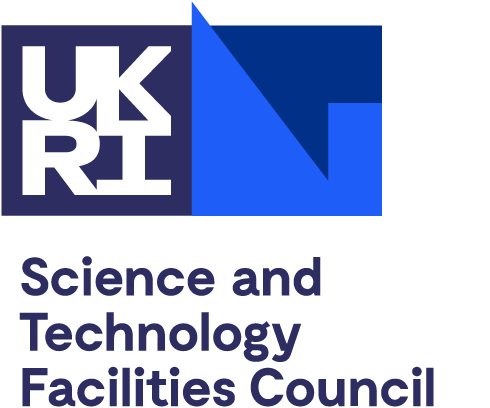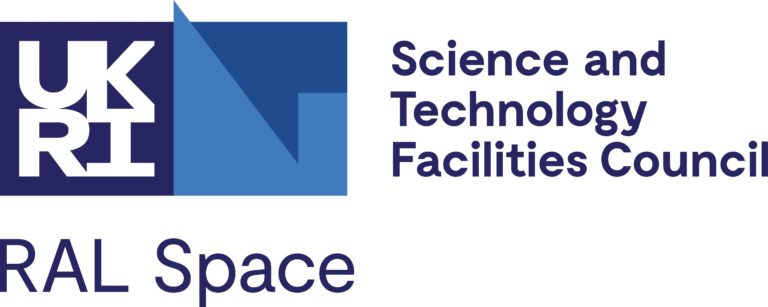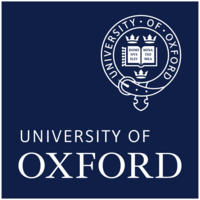My Place, My Science
Building science capital with young people from African Families in the UK
Building cultural connections
The My Place, My Science project is all about supporting young people of African and black Caribbean heritage to enjoy science and build cultural connections.
Together with colleagues from Oxford University’s science departments, the Museum is working with the community organisation African Families in the UK (AFiUK) to create a culturally safe space to learn together through a programme of events and workshops.
Building on the Science Together initiative, this community-orientated programme is fostering relationships between University departments, local community organisations, and other regional science partners.
While it is based in Blackbird Leys — which is among the 20% most-deprived wards in the UK — My Place, My Science also attracts families from other areas.
The children engaging in the project — who come from first- or second-generation migrant families — can use their experiences to tackle some of the barriers they may face, like racialisation and low socio-economic input.

Young people and adults from African Families in the UK with scientists and researchers at the co-created sharing event at the History of Science Museum, May 2024
Belonging and equal opportunity
Supporting AFiUK's core mission, these informal, facilitated activities help foster a sense of belonging and equal opportunity.
In addition to sessions in the Museum, the programme goes out to where science is happening every day, including Oxford University's science facilities and partners like the:
- biotech company Vertex Pharmaceuticals
- UKRI research facility Diamond Light
- City College’s Technology campus.
Through taking part in this programme, children from African families living in the UK can take the opportunity to:
- engage in conversation and build communication networks within their families and community
- build confidence and self-esteem
- gain real-world experiences of science by engaging directly with scientists
- foster identity through culturally specific links with science
- cross bridges to the places where science is happening — places that may feel unfamiliar and inaccessible.
In summer 2024, the young people in the group co-created an event at the History of Science Museum, where they shared their experiences of science and culture with other Museum visitors.
From October 2024 to September 2025, the My Place, My Science project is funded by a Science and Technology Facilities Council (STFC) Spark Award.
My Place My Science – Nucleus Award (2025-2028)
October 2025 saw the start of a new iteration of My Place My Science funded by a Nucleus Award from the UKRI's Science and Technology Facilities Council (STFC). This will provide funding for the project until 31st March 2028.
The new project will build on the previous relationship with African Families in the UK. It also draws in new partners to the project:
- The Oxford Academy, a secondary school based in the Blackbird Leys area of Oxford which may of the young people attend
- The Leys College, a branch of the City of Oxford College which specialises in technology.
The new project will also introduce three new strands of activity. This will diversify and widen the opportunities for the young people to engage with science in ways that suit them individually depending on where their interests lie:
- CREST (Creativity in Science and Technology) awards: small-scale science accredited science investigations supported by Oxford’s Physics Department with different age groups
- Co-curation: working with the Museum’s curator of Oxford Science and the Learning Producer to tell stories about science. They will use objects and models in a display case installed at a branch of The Leys College based in Blackbird Leys
- Reflective journals for the young people to record and reflect upon their experiences, and to promote intergenerational conversation with families and the community.
What we've achieved together
Experiments at the Museum
Experiments in the Top Gallery
Looking closer with microscopes
Experimenting with nitrogen
Suturing workshop
Amazing magnets
2025
16 January 2025
Young people and adults from AfiUK were joined by researchers from Astrophysics along with the Kennedy and Botnar Institutes and the History of Science Museum at Activate Learning’s Blackbird Leys Technology campus.
We enjoyed a range of activities related to astronomy, including:
- object handling from the Museum
- discovering spectroscopy and its use in astronomy
- a model particle accelerator, and
- finding out about Space Laboratory experiments.
The star attraction was the inflatable planetarium brought to us by our partners at the Rutherford Appleton Laboratory.
Groups of up to 8 children at a time were treated to shows uncovering mysteries of the Universe.
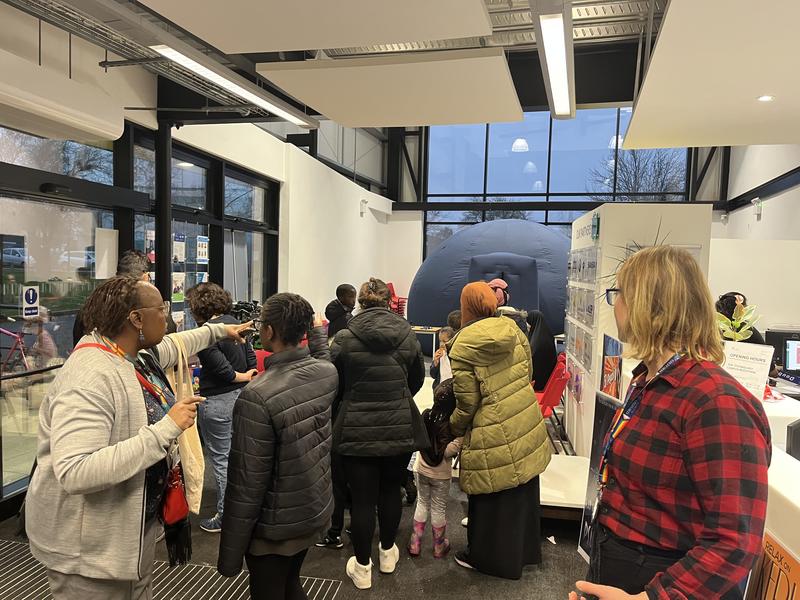
Inflatable planetarium
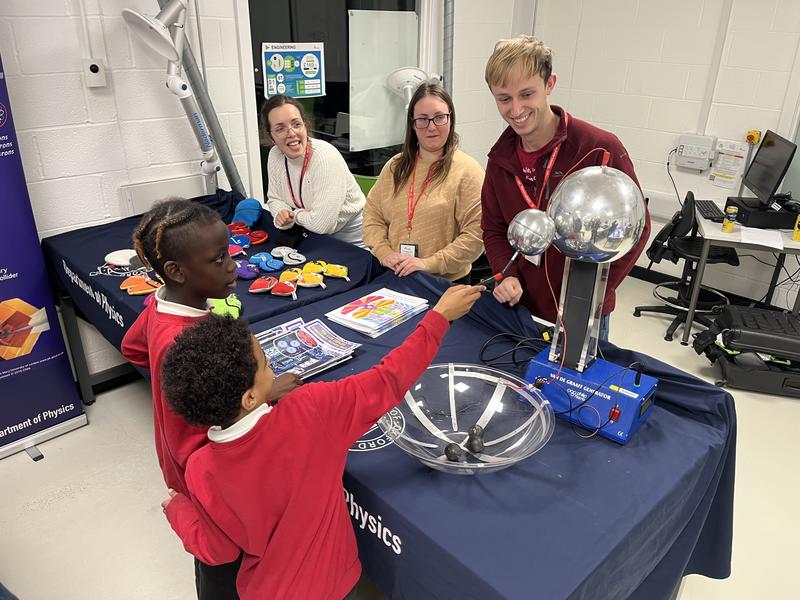
Particle accelerator demonstration
What the young people said:
I liked learning about the science and how they send human cells to space to learn how the nucleus develops in space. (13 years)
I like everything — it was so good and I want to come back next time. (11 years)
18 February 2025
This year we returned to Vertex Pharmaceuticals’ Learning Laboratory for an introduction to forensics.
The group of young people and adults from AfiUK, many of who had visited Vertex last year, applied themselves to a chemistry challenge to test and identify the unknown substance at the crime scene.
They chatted to scientists over lunch and learnt about the company’s internship programme.
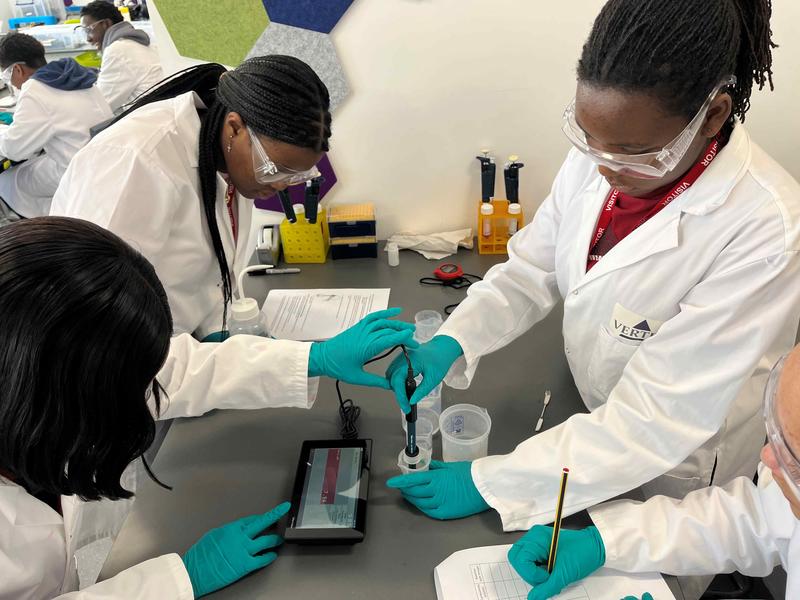
Hands on with new equipment
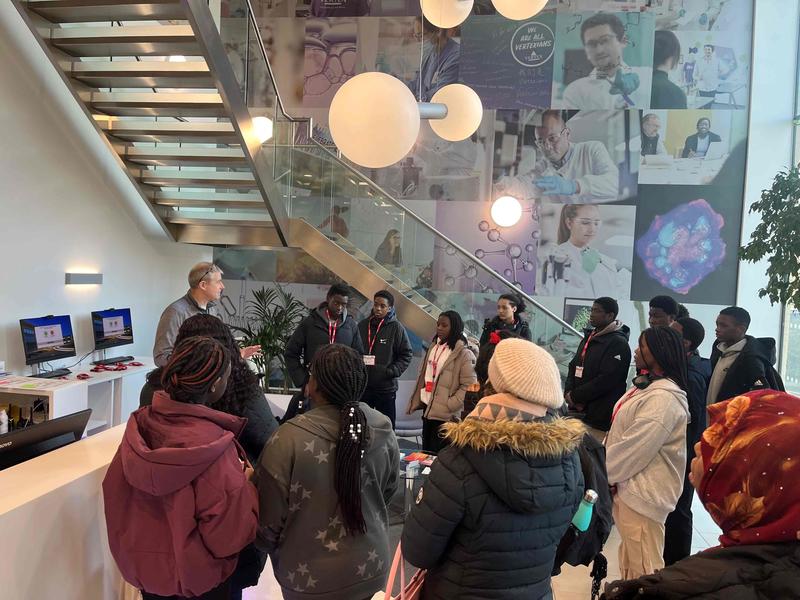
Welcome
What the young people said:
I really enjoyed the experience — everyone was so nice; they gave great instructions which were also clear. (13 years)
I liked that we were in control and it was a mystery about what to find. (13 years)
20 February 2025
A large group of 30 your people from AfiUK across primary and secondary age ranges took up the opportunity to visit our new partners in this year’s My Place My Science event at the Rutherford Appleton Laboratory (RAL).
Guided by RAL’s public engagement team, we enjoyed a 3-hour workshop introducing space exploration.
This included:
- opportunities for the teenagers to interview scientists working at RAL
- a visit to the clean room research facility in full gear, and
- a spectacular tour of the Space Laboratory, including the test equipment for satellites and other space gadgets.
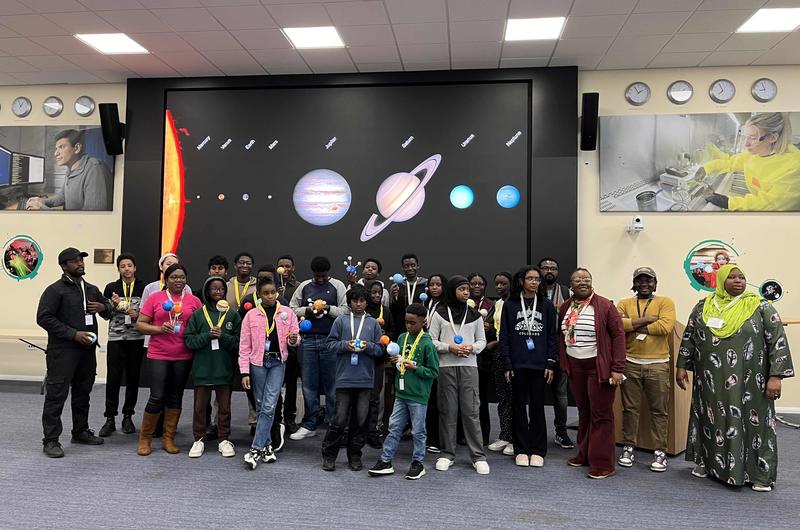
African Families in the UK (AFiUK) group photo
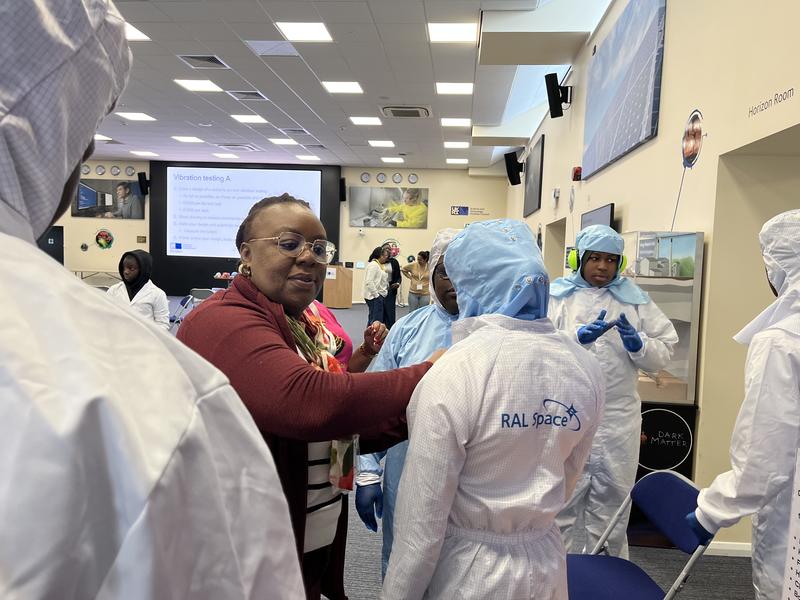
Getting ready for the clean room visit
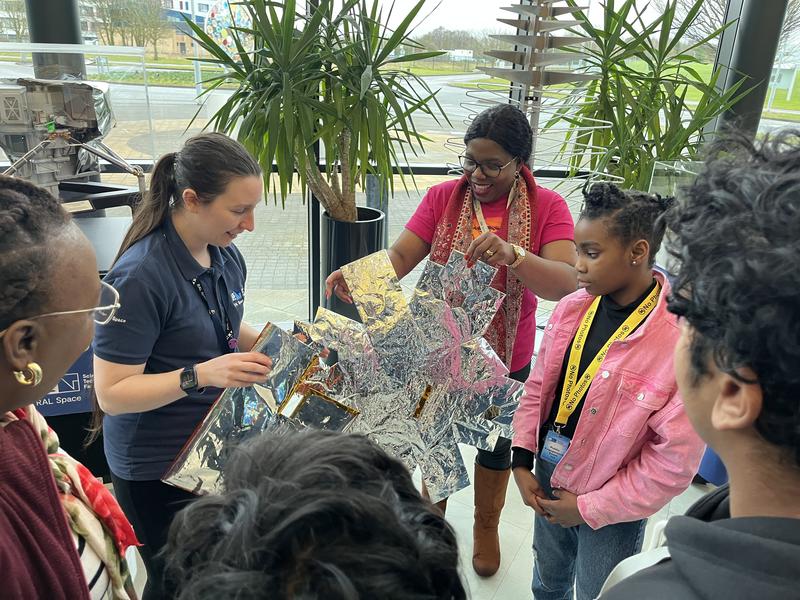
Inspecting satellite insulation material
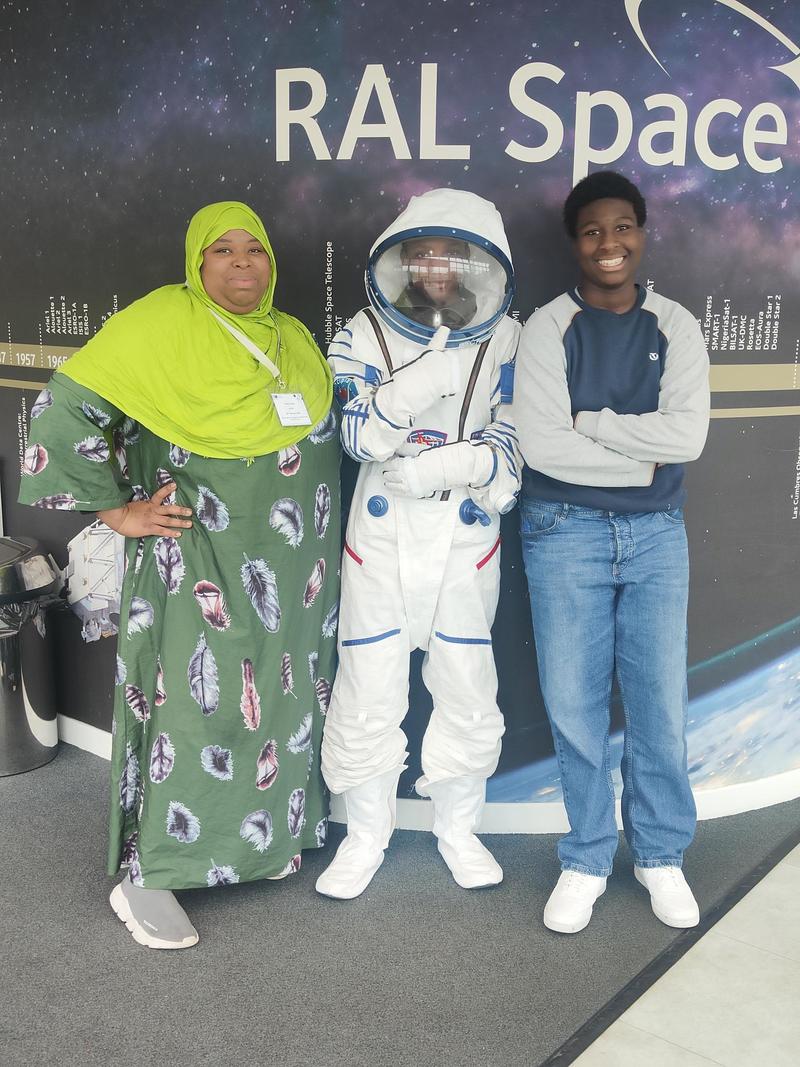
Trainee astronaut recruited!
What the young people said:
I found it very interesting learning about space and the different planets. (13 years)
I liked how we were able to see all the clean rooms and the fun activities they had. (14 years)
I think everything was really enjoyable and everyone was really nice and I learned a lot. (16 years)
17 April 2025
Accompanied by parent ambassadors, a group of 30 young people from African Families in the UK (AFiUK) took part in a day all about telescopes at Oxford Astrophysics.
This included:
- citizen science projects Galaxy Zoo and Zooniverse, in which the young people took part in classifying stars from distant galaxies, and
- a virtual link-up with scientists at South Africa’s MeerKAT facility, a giant array of 64 radio telescopes.
The Q&A session was facilitated by Oxford Astrophysicist Professor Rob Fender and the young people — from primary and secondary age ranges — had a seemingly endless stream of questions to put to the African scientists.
The day’s programme also included a carousel of experiments and demonstrations from the year’s programme. The young people voted for their favourites to include in the May 2025 Museum sharing event.
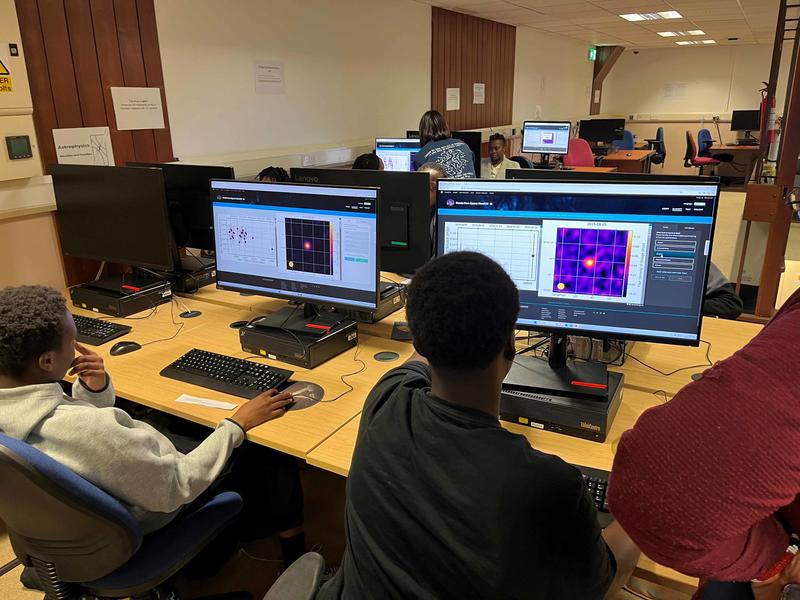
Classifying stars on Zooniverse Citizen Science programme
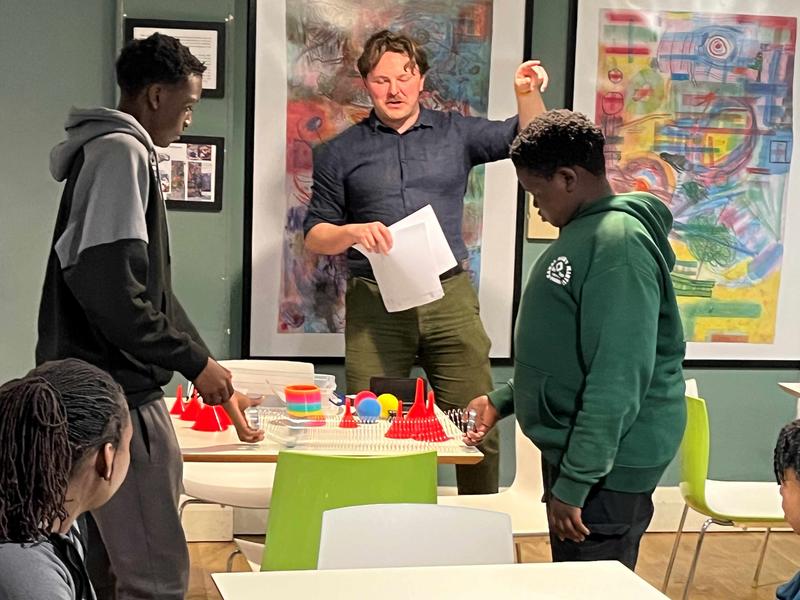
Modelling radio waves
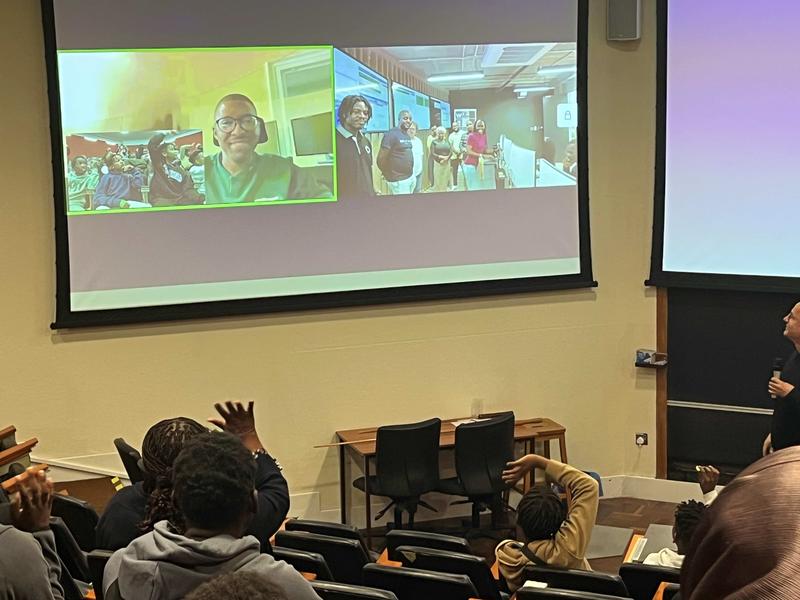
Virtual link up with South African MeerKAT telescope
What the young people said:
‘I enjoyed finding out about different types of galaxies that haven’t been explored’. (Young person from African Families in the UK)
I liked the Zoom call with the scientists because it was interesting and informative. (Serah, 13 years)
I liked when we ask questions to the telescope people. (Emmanuel, 11 years)
29 May 2025
We celebrated the 2024-25 My Place, My Science project with an event in the Museum co-created by the young people with support from the scientists and researchers they had been working with throughout the year.
Following a rehearsal event earlier in the month, the young people invited members of their extended community to the Museum to celebrate their favourite experiments and stories about science from the year’s workshops.
A group of 12 young people, ranging from 7-17 years old, created a visitor welcome in the Entrance Gallery and prepared an exciting range of experiments to demonstrate and share with visitors to the Museum, including:
- the use of infra-red cameras in space exploration
- understanding the brain through coordination games
- building and testing structures for rocket launch
- trying on space suits
- demonstrating sundials from the Museum’s collection.
They were joined by the Oxford scientists they had been working with, including the Centre for Integrative Neuroimaging, and our partners from the Rutherford Appleton Space Laboratory (RAL Space).
The event attracted many supporters from the local community along with other museum visitors. It was followed by a celebratory lunch in the Garden Room at Trinity College.

Young people playing a card game to learn about science and brain function

Exploring the human brain using mind-boggling spectacles

Young people welcoming visitors to the Museum

Young person wearing a real astronaut suit from RAL Space
What the young people said:
‘I found it most interesting that I can talk to people with no fear’. (Ouley, 11 years)
I found the activities very enjoyable; it was nice to do some practical work; the scientists I met was very interesting and I learned a lot from their experiences and the history of science (Husna, 15 years)
It was enjoyable to welcome people; I learnt about North Africa. (Young person, 13 years)
21 June 2025
With the help of a travel grant from the University’s Science Together programme, a group of 30 young people and adults from the African Families in the UK took the unique opportunity to visit London for the day to experience the immersive show The Moonwalkers at The Lightroom in Kings Cross, and a discovery day event at The Francis Crick Institute nearby.
Following The Moonwalkers, the young people met with the co-writer-director Chris Riley over lunch. He gave an account of how the show had been put together and answered their many questions about film-making and story-telling in science.

The Moonwalkers at The Lightbox

Young people at The Moonwalkers
28 June 2025
The final event of the 2024-25 Spark award funded iteration of My Place My Science was a visit to the Centre for Integrative Neuroimaging’s MRI brain-scanner facility at the John Radcliffe hospital.
As well as witnessing a brain-scan in process, they were able to experiment by setting the subject tasks such as imagining their favourite song. They also took part some ongoing research by participating in computer games designed to test reaction responses.
Over lunch, the young people found out more about what motivated the researchers and how they got into the project.

Brain scan at the Oxford Centre for Integrative Neuroimaging

Young people at Oxford Centre for Integrative Neuroimaging
What the young people said:
I enjoyed seeing the MRI scanning. The people were very friendly and approachable (Justin, 23 years)
The people were friendly. The MRI was super cool! (Nathan, 18 years)
I was interested in looking at a brain and also the blood flow and looking at a £8m MRI machine for the first time. (Curtis, 15 years)
30 October 2025
The new My Place, My Science project began with a workshop at the History of Science Museum focussing on the history of early cameras and photography, including the beginnings of astronomer’s experiments with astrophotography.
A group of 18 young people and four adults from African Families in the UK took part in activities such as:
- exploring historical cameras from the handling collection
- discovering the cyanotype process invented by the astronomer and chemist John Herschel and pioneered by the botanist Anna Atkins, and
- investigating and making model camera obscuras.

Young people working with cyanotype photography

Exploring a camera obscura
2024
Thursday 18 January 2024
Hosted by Oxford City College’s Technology Campus in Blackbird Leys, this event was specifically aimed at members of AFiUK and open to wider members of the local community.
The weather conditions were ideal and participants enjoyed clear views of the surface of the Moon, Jupiter and its Moons, and Saturn.
As well as modern telescopes and activities organised by Oxford Physics, participants were able to experiment with a Galilean telescope and handling objects from the Museum.
The event included stalls with activities facilitated by research students from Astrophysics including calculating the scale of the solar system and experimenting with infra-red cameras.
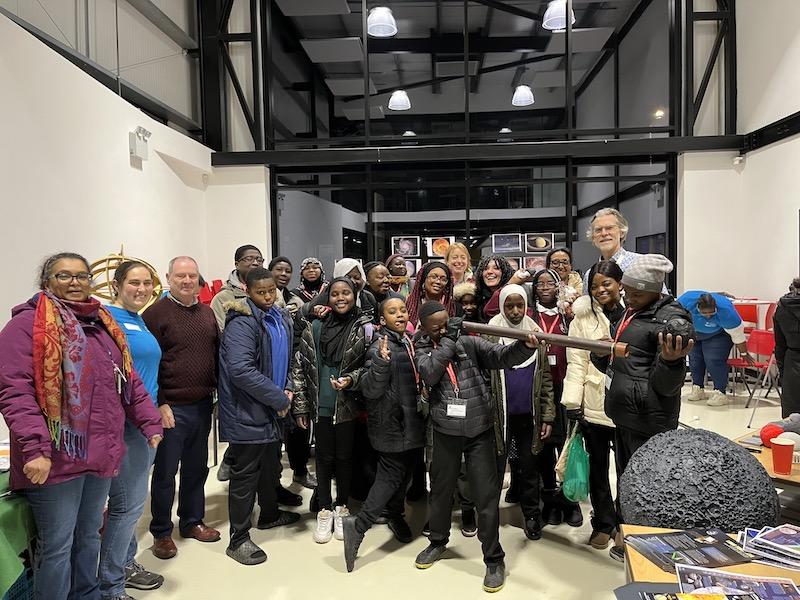
Young people and adults from AfiUK at Activate Learning
They [the scientists] were nice, friendly and answering clearly all our questions.
I can’t believe I saw the Moon!
> A stellar success: community stargazing | University of Oxford Department of Physics
Monday 12 February 2024
The group visited the Physics Department again. Supported by young researchers, they enjoyed an interactive workshop and activities investigating the science of climate change.
The young people and their families enjoyed demonstrations of the double-jointed chaotic pendulum, illustrating how difficult it is to predict the weather.
They learned about climate change and extreme weather events in tropical areas including the Caribbean, and made their own weather stations, including anemometers to measure wind speed.
This visit made me surprised because I didn’t know how fantastic and complex the climate is and how hard it is to try and predict how the climate would be. (15 yrs)
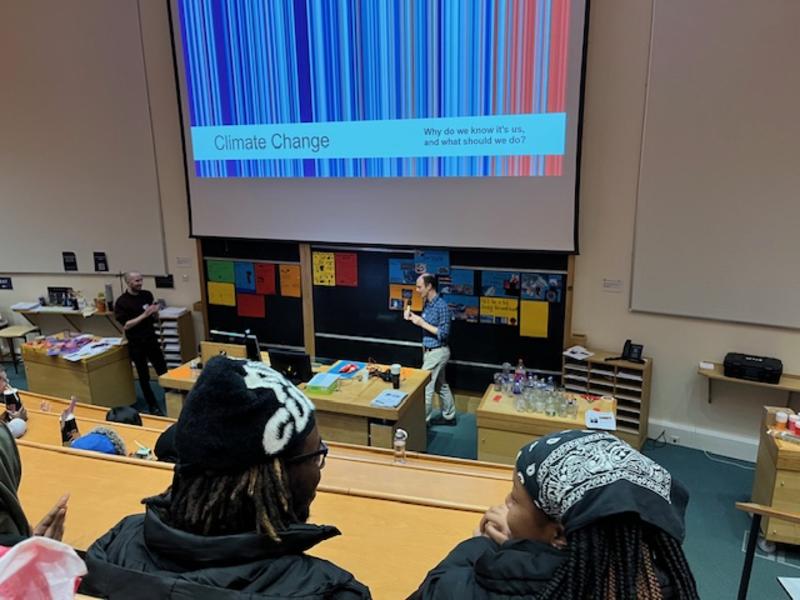
Climate change workshop
Thursday 15 February 2024
A group of teenagers and adults from AFiUK visited the biotech company Vertex Pharmaceuticals for a facilitated workshop in a fully equipped modern teaching laboratory.
Sickle cell anaemia is a hereditary disease that is relatively common among people of African descent, and we used powerful microscope to look at blood samples, including sickle cells.
We also learned how to use micropipettes and carried out a test on DNA samples to detect the presence of the sickle cell gene.
The young people met and chatted over lunch to scientists working for the company and found out about the student intern programme.
Another student was able to relate the information to a case in his own family history.
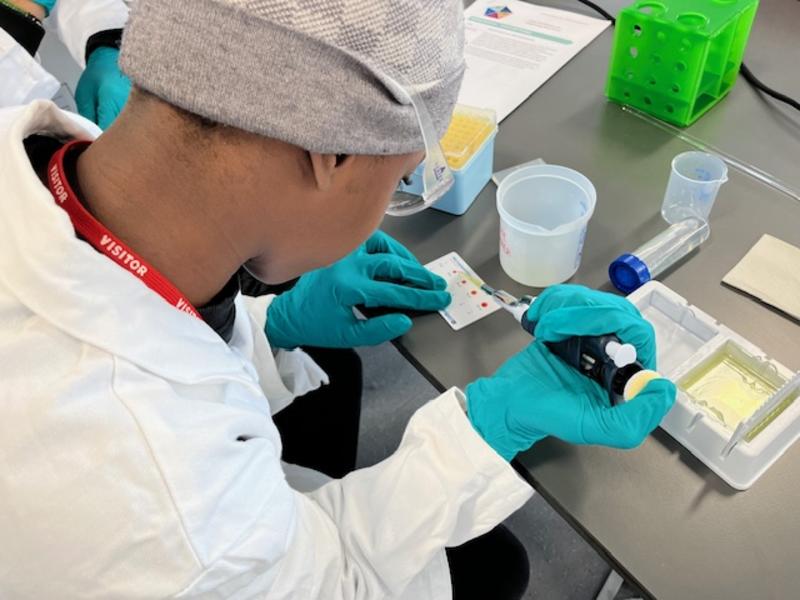
Testing for sickle cell
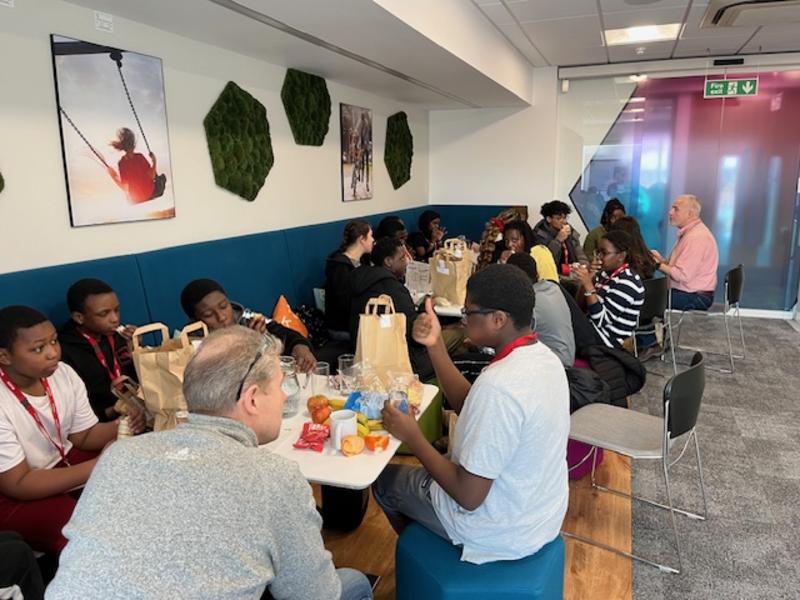
Chatting over lunch
I really liked the practical work we did and learning about how to diagnose sickle cell disease. (15 yrs)
28 May 2024
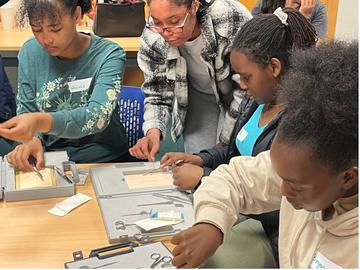
Suturing workshop
What happens to the human body during space travel?
This was one of the intriguing questions a group of young people explored when they visited Oxford University’s Botnar Institute (NDORMS).
The young people toured the laboratories, learning about researchers' investigations into the effects of ageing from astronauts who experience accelerated ageing during space travel (that is then reversed when they return to Earth).
The group also visited the communications room scientists used during their investigations to communicate with fellow scientists in the European Space Laboratory.
In a related medical workshop, they also tried their hand at suturing and ultrasound investigation.
30 May 2024
We celebrated the end of the 2023-24 My Place My Science project with an event co-created by the young people themselves.
The group from African Families in the UK invited members of their extended community to the Museum to celebrate their favourite experiments and stories about science from the year’s workshops.

Experimenting with nitrogen
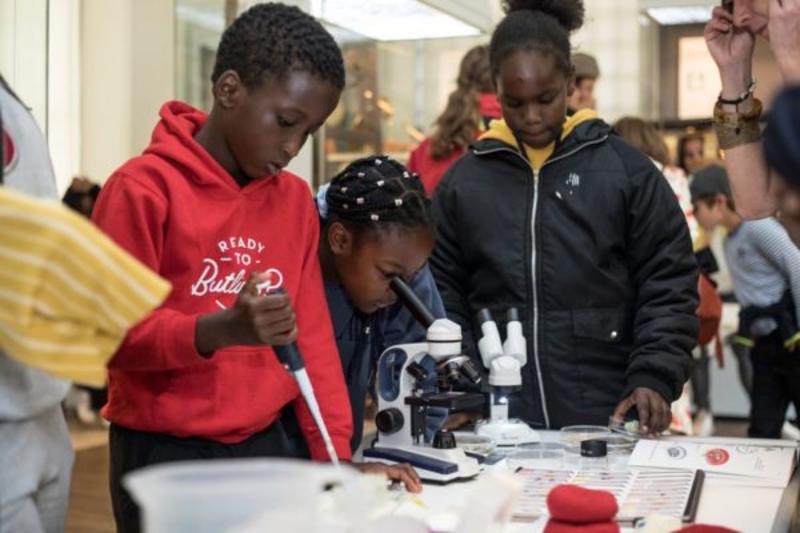
Looking closer with microscopes
During a preparatory visit to the Museum in April, the young people met Dr JC Niala, Head of Research, Teaching and Collections, whose family originates from Kenya.
For the Festival event in May, a group of 12 young people, ranging from 7-17 years old, created a visitor welcome in the Entrance Gallery and choose exciting experiments to demonstrate, including:
- super-conducting magnets
- investigating the solar system
- investigating organ pathology with microscopes
- electromagnetism, and
- investigating sickle cell disease.
They were joined by both the Oxford scientists they had been working with, and our partners from Vertex Pharmaceuticals.
The event attracted many supporters from the local community and was followed by a wonderful celebration in the Garden Room at Trinity College.
The young people also received certificates acknowledging their achievements over an extraordinary year.
What the young people said:
I felt worried, scared and other stuff, but it was really good; it was nice and calm and I liked it very much but it was scary to talk to people I didn't know.
I enjoyed explaining how magnets work to people who didn't know what they were. I felt nervous at first then gained confidence.
I enjoyed learning and interacting with visitors. I also enjoyed talking and helping others.
What visitors said:
I loved the way you present science. The best thing is having the children explaining. [2 adults]
The kids explained the experiments really well and got the children involved. It was fun. [1 adult; 1 child]
The children did a really good presentation. We were surprised at what was happening but my son enjoyed looking into the microscopes and playing with magnets. [2 adults; 1 child]
The children were very knowledgable. I learned a lot about sickle cell and on the solar system. I enjoyed the nitrogen experiment and all my questions were answered. Well done. [2 adults]
31 October 2024
Scientists from the Botnar and Kennedy Institutes joined AfiUK in their annual celebration of Black History Month at the community library in Blackbird Leys.
They shared games and activities with the young people, highlighting the role of black scientists across the globe.
1 November 2024
A group of young people from AfiUK, accompanied by parent ambassadors, enjoyed a workshop at the History of Science Museum about astronomy and time-telling.
As well as making their own model diptych dials (a type of pocket sundial base on sixteenth-century originals in the collection), they met Dr Sumner Braund, the Museum's Curator of Founding Collections.
Sumner treated them to a close encounter with a centuries-old astrolabe originating from North Africa.

Making diptych sundials
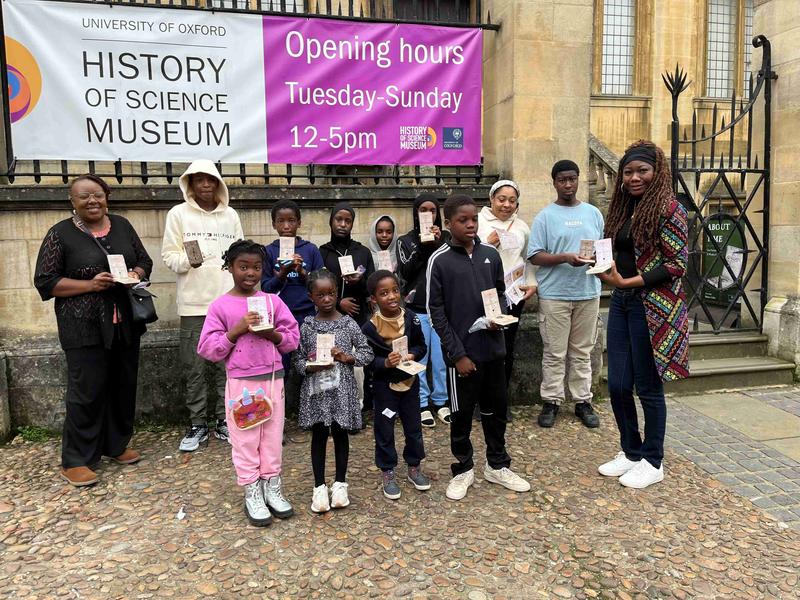
Young people and adults outside the Museum
What the young people said:
I enjoyed making the models [sundials] and seeing the old objects. (11 years)
21 November 2024
Our partners at the Wellcome Centre for Integrative Neuroimaging joined us at Activate Learning’s Blackbird Leys Technology campus for this event introducing current research on the brain.
The young people enjoyed puzzling out the challenges presented to them in the Brain Escape Room and a range of other activities related to how the brain works, including games and experiments.
They also met with young researchers from the department.
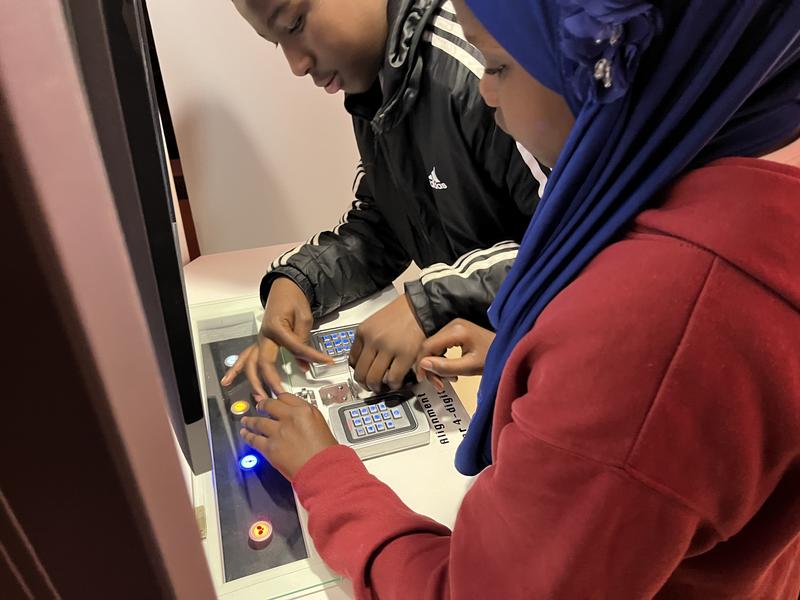
Challenging perception
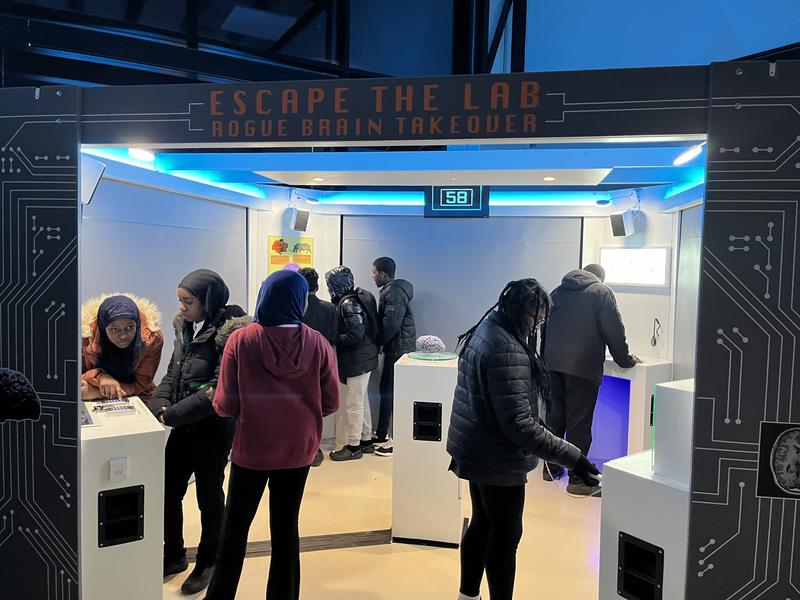
The Escape Room
What the young people said:
I liked the card game. All the games were good and I liked the escape room activity. (15 years)
I love everything – it was so fun I want to come back. (11 years)
15-year-old Serah Pulai from African Families in the UK shares her experiences during the Escape the Lab event.
30 November 2024
A group of around 30 young people from AfiUK returned to the Physics Department to meet researchers investigating the Moon.
Older students learned about the use of infra-red cameras for research in astrophysics, while the younger ones learned about the phases of the Moon and made their own lunar phase trackers.
Everyone enjoyed the interactive activity making model craters, which led to the creation of a fabulous array of printed images of their craters using coloured powders including turmeric.
The young people enjoyed chatting with the researchers over pizzas at lunchtime.
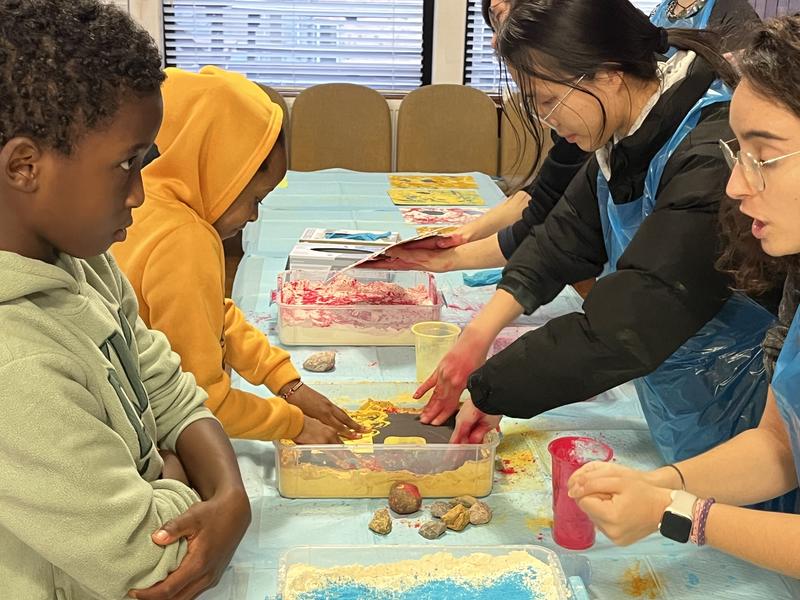
Modelling moon craters
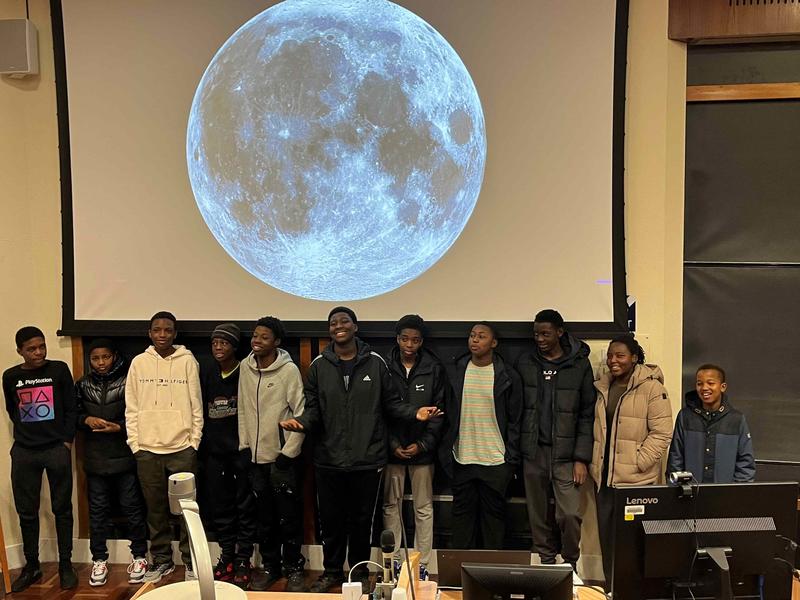
Moon workshop
What the young people said:
I found the moon sculpture fun because you could see how detailed and decorative the moon is and I felt that I was holding the moon for real. (14 years)
It was good when we made craters and learned about the moon. (10 years)
2023
26 October 2023
Members of the African Families in the UK community came together for an evening exploring history and identity, sharing African heritage cultures, with storytelling and activities at the Blackbird Leys Community Library.
27 October 2023
Young people with parents and parent advocates from AFiUK visited the Museum for a workshop all about the invention of wireless communication.
Activities included using telegraphic apparatus to discover Morse code messaging, and making simple crystal radio receivers which they tried out in the gallery.
I took part in an activity communicating through Morse code and was able to create a circuit connected to a radio.
I really enjoyed this trip and hope to return in the near future.
I loved when we went to the museum because we got to see some cool stuff like Einstein’s blackboard.
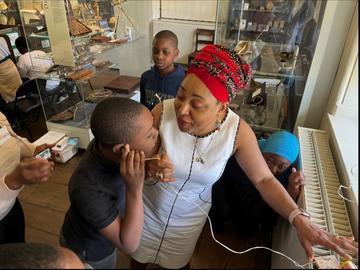
Investigating a 1930s crystal radio set
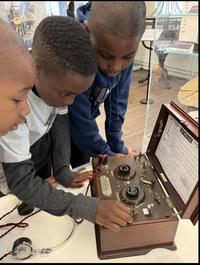
Testing crystal radio circuits
25 November 2023
Young people with parents and parent advocates from AFiUK visited the Physics Department for exciting workshops facilitated by young researchers which were all about magnetism.
The younger children enjoyed exploring the phenomenon of magnetism and making a model loud speaker, while the older children discovered the amazing world of supercooled magnets.
We all came together for a live interactive presentation followed by welcome refreshments.
Today was surprising and interesting and fun. This was the best day ever. Thank you for having me. (12 yrs)
I found it interesting learning about liquid nitrogen and properties of magnets and how we can use the track to levitate magnets with superconductors. (16 yrs)
The people here are nice – the scientists are patient – I would like to be a scientist. (14 yrs)
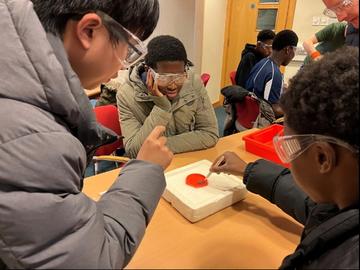
Experimenting with supercooled magnets

Building model loudspeakers
Working in partnership






